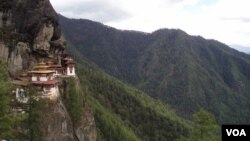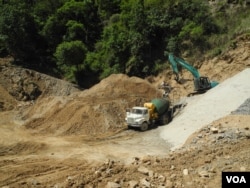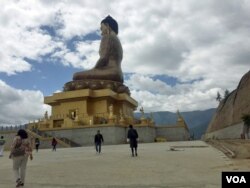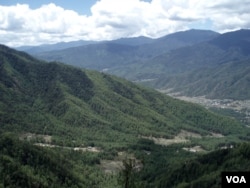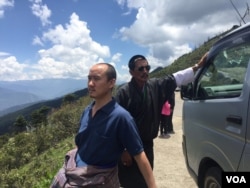Bhutan, a land of pristine beauty that restricts the numbers of overseas visitors, is facing pressure to allow more tourists to increase incomes and create more jobs. But there are fears that mass tourism could threaten the tiny Himalayan country’s efforts to preserve itself as the world’s last Shangri-La.
After a day spent gazing at breathtaking mountain passes, an awe-inspiring 17th century Buddhist fortress-like monastery perched on a lush hilltop, and emerald green rice fields on the banks of a gushing river, a large group of Indian tourists relaxes at a sprawling 50-room hotel that opened in Punakha last year.
"I see more of Indian people coming to our hotel," said Karma Phuntsho, the hotel's owner. "Overall in Bhutan, I think slowly Indian tourists will be dominating our market."
New hotels are multiplying
In recent years, new hotels have mushroomed in Bhutan and more are under construction. Roads are being widened both to cope with the influx of vehicles ferrying tourists and to build new hydroelectric projects.
But while tourism is booming, Bhutan’s plans to become a high-end destination for dollar-paying tourists are not going quite as hoped.
High daily tariff discourages Western tourists
The country imposes a high tariff of $ 250 per day for lodging, food and travel for visitors from outside South Asia to promote a policy of "high value, low impact." But the number of Western tourists is plummeting as this steep tariff discourages many visitors from the United States and high-income countries in Europe, which have faced several years of economic turbulence.
However, tourists from neighboring India, who are not required to spend the minimum per day tariff, are arriving in large numbers as their economy booms. They made up nearly two-thirds of the roughly 100,000 visitors to the quaint Himalayan country last year.
Division on tourism issue
Now Bhutanese are split down the middle, both in the government and the tourism industry. While some are calling for regulating regional visitors, others are clamoring for Bhutan to open up by doing away with the minimum tariff imposed on visitors from countries outside South Asia.
Tourism is the country’s second biggest industry and provides the most jobs.
Hotel owner Phuntsho points out that besides employing 75 people, his hotel provides a much-needed boost for local communities.
"We buy a lot of vegetables from our farmers and then also we try to give priority to the local people, to employ people from this native place," he said.
But others worry that this landlocked nation of about 750,000 could lose the carefully cultivated mystique of a country that has consciously steered away from Asia’s frenzied rush to modernization and economic progress and pioneered the concept of gross national happiness in place of gross domestic product.
Money can't buy what Bhutan possesses
Gayley Yangzon, who recently opened a hotel in Paro, is among a handful of Bhutanese who has traveled the world. Often questioned about what is different in Bhutan, she says, "The nature, the air, no amount of money can buy this air, the forest, the flowers. We may not be so rich, but we have our own richness."
And while the tourist trade is pushing to open up the sector to boost the economy, some in the industry are aware of the risks. Among those opposed to mass tourism is one of Bhutan’s leading tour operators, Karma Lotey.
"We are very vulnerable, such a small country, small society, the culture, the tradition, everything is small and once we open up to mass tourism, there can be stampede, it can become very suffocating," he frets. "It is very important for us to protect our niche, the special things that we have in the country."
Like many others, Lotey wants measures to control regional tourists. He points to some who are "crowding six to seven in a room, crowding eight to nine, 10 people in a Balero (SUV), bringing their own things to cook and camp." That’s very different from the high-spending tourist the country set out to woo.
Ministers and lawmakers are pondering on how to move ahead. Among those who keenly watched a recent lively debate in parliament was freelance tourist guide Sonam Dorji.
He has much at stake. Dorji says compared to being employed for about three months when he started working in 2002, he is now fully occupied for eight months, showing visitors around the country or guiding them as they trek up mountains.
"Now there are big changes because there are lots of tourists, there are lots of opportunities for us and we have enough work and we are even hoping to get it better in future," he says.
Dorji, who has two young children and ambitions to open a restaurant one day, says Bhutanese "as a whole, they are against the mass tourism, but we always dream to have enough work."




